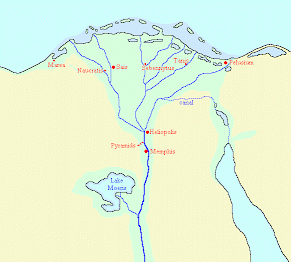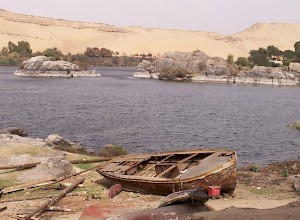Herodotus, bk 2, logos 4
Herodotus of Halicarnassus (c.480-c.429 BCE): Greek researcher, often called the world's first historian. In The Histories, he describes the expansion of the Achaemenid Empire under its kings Cyrus the Great, Cambyses, and Darius I the Great, culminating in Xerxes' expedition to Greece (480 BCE), which met with disaster in the naval engagement at Salamis and the battles at Plataea and Mycale. Herodotus' book also contains ethnographic descriptions of the peoples that the Persians have conquered, fairy tales, gossip, and legends.
The geography of Egypt (2.1-34)

After the death of king Cyrus the Great, his son Cambyses becomes the new king of Persia. His plan to conquer Egypt gives Herodotus the opportunity to devote three logoi to the ancient kingdom on the banks of the Nile.
In the first logos of Book Two, he gives a description of the country. He starts with a (rather unconvincing) proof that the Egyptian language is one of the oldest in the world. Then, Herodotus discusses the Egyptian calendar (which he considers to be better than the Greek one), and explains that Egypt consists of alluvial deposits of the Nile (it is "a gift of the Nile"). He continues with a description of the size of the country and ridicules the opinions of earlier, Greek researchers on this subject. Having pointed out the absurdities of their opinions, he describes the inundation of the Nile, tries to explain its rising, and tells several stories about the sources of this river.
Comment

Although he sometimes errs, Herodotus shows himself an unbiased and critical observer. His observation of the Nile valley as an alluvium is scientific triumph; his discussion of the cause of the inundation of this river is exemplary. However, we also see an unpleasant aspect of Herodotus' character: he frequently attacks the Ionian researcher Hecataeus of Miletus (see below), and rather unfairly too.
A remarkable aspect of Herodotus' account that he often tries to present Egypt as the oldest country in the world, which makes the inhabitants it the exact opposites of Scythia (below), the world's youngest people.